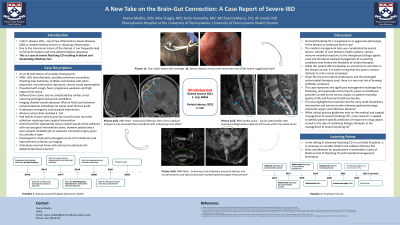Monday Poster Session
Category: IBD
P2717 - A New Take on the Brain-Gut Connection: A Case Report of Severe IBD
Monday, October 28, 2024
10:30 AM - 4:00 PM ET
Location: Exhibit Hall E

Has Audio

Veena Madhu, MD
Penn Medicine
Philadelphia, PA
Presenting Author(s)
Veena Madhu, MD1, Hiba Hameed Chagla, MD1, Anila Vasireddy, MD2, Michael Demarco, DO1, Ali Ismail, MD1
1Penn Medicine, Philadelphia, PA; 2University of Pennsylvania Health System, Philadelphia, PA
Introduction: Crohn's disease is characterized by chronic inflammation of the gastrointestinal tract, complicated by the development of fistulas and abscesses, which can present in unique manners and prove challenging to manage.
Case Description/Methods: A 47-year-old male with a history of Crohn’s disease complicated with recurrent fistulae, multiple abscess sites in the pelvic region and chronic sacral osteomyelitis, presented with cough, fever and progressive weakness. He suffered a witnessed tonic-clonic seizure complicated by cardiac arrest requiring prolonged mechanical ventilation. Brain imaging demonstrated a right parietal abscess and right cerebral subdural empyema with significant mass effect. He underwent emergency neurosurgical intervention with a parietal craniotomy and drainage of subdural empyema. Intravenous antibiotics were initiated based on biopsy culture data. He developed further seizure activity post-operatively and repeat imaging revealed re-enlargement of the known subdural collection, which required additional surgical intervention. While initial pelvic imaging did not identify a source of infection, a repeat MRI pelvis revealed an extensive pelvic fistula and pre-sacral abscess that extended into the spinal canal with associated peri-neural abscesses. This was thought to be the most likely source of his intracranial infections. Following discussions with multiple surgical specialties, it was determined that appropriate source control would not be achieved with neurosurgical interventions alone, however the patient was also a poor surgical candidate for an extensive colorectal surgery given his critically ill state. He remained on IV antibiotics and subsequent brain imaging showed overall improvement. He was discharged to long-term rehab with plans to undergo an elective abdominoperineal resection after maximum optimization.
Discussion: This case highlights the necessity of considering the potential for extensive and possibly distant infectious foci in the setting of fistulizing Crohn’s disease, the critical role that surgical specialties play in its management and the importance of early colorectal surgery involvement in refractory cases. Further studies are warranted to optimize the prevention and management of these severe complications.
Disclosures:
Veena Madhu, MD1, Hiba Hameed Chagla, MD1, Anila Vasireddy, MD2, Michael Demarco, DO1, Ali Ismail, MD1. P2717 - A New Take on the Brain-Gut Connection: A Case Report of Severe IBD, ACG 2024 Annual Scientific Meeting Abstracts. Philadelphia, PA: American College of Gastroenterology.
1Penn Medicine, Philadelphia, PA; 2University of Pennsylvania Health System, Philadelphia, PA
Introduction: Crohn's disease is characterized by chronic inflammation of the gastrointestinal tract, complicated by the development of fistulas and abscesses, which can present in unique manners and prove challenging to manage.
Case Description/Methods: A 47-year-old male with a history of Crohn’s disease complicated with recurrent fistulae, multiple abscess sites in the pelvic region and chronic sacral osteomyelitis, presented with cough, fever and progressive weakness. He suffered a witnessed tonic-clonic seizure complicated by cardiac arrest requiring prolonged mechanical ventilation. Brain imaging demonstrated a right parietal abscess and right cerebral subdural empyema with significant mass effect. He underwent emergency neurosurgical intervention with a parietal craniotomy and drainage of subdural empyema. Intravenous antibiotics were initiated based on biopsy culture data. He developed further seizure activity post-operatively and repeat imaging revealed re-enlargement of the known subdural collection, which required additional surgical intervention. While initial pelvic imaging did not identify a source of infection, a repeat MRI pelvis revealed an extensive pelvic fistula and pre-sacral abscess that extended into the spinal canal with associated peri-neural abscesses. This was thought to be the most likely source of his intracranial infections. Following discussions with multiple surgical specialties, it was determined that appropriate source control would not be achieved with neurosurgical interventions alone, however the patient was also a poor surgical candidate for an extensive colorectal surgery given his critically ill state. He remained on IV antibiotics and subsequent brain imaging showed overall improvement. He was discharged to long-term rehab with plans to undergo an elective abdominoperineal resection after maximum optimization.
Discussion: This case highlights the necessity of considering the potential for extensive and possibly distant infectious foci in the setting of fistulizing Crohn’s disease, the critical role that surgical specialties play in its management and the importance of early colorectal surgery involvement in refractory cases. Further studies are warranted to optimize the prevention and management of these severe complications.
Disclosures:
Veena Madhu indicated no relevant financial relationships.
Hiba Hameed Chagla indicated no relevant financial relationships.
Anila Vasireddy indicated no relevant financial relationships.
Michael Demarco indicated no relevant financial relationships.
Ali Ismail indicated no relevant financial relationships.
Veena Madhu, MD1, Hiba Hameed Chagla, MD1, Anila Vasireddy, MD2, Michael Demarco, DO1, Ali Ismail, MD1. P2717 - A New Take on the Brain-Gut Connection: A Case Report of Severe IBD, ACG 2024 Annual Scientific Meeting Abstracts. Philadelphia, PA: American College of Gastroenterology.
